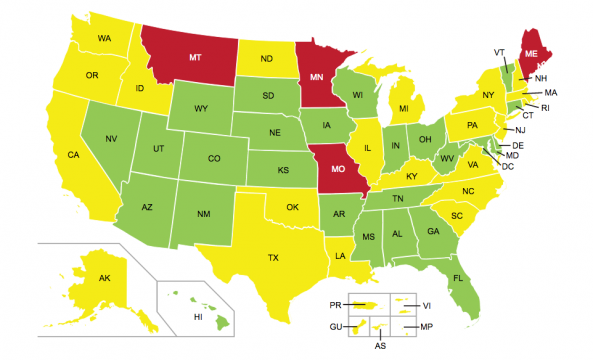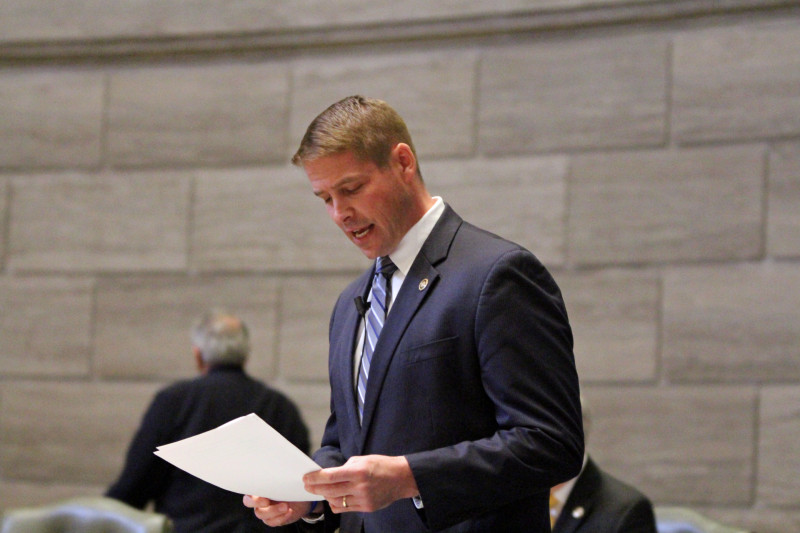JEFFERSON CITY, Mo. – Lt. Gov. Mike Parson says it’s “one of the most important pieces of legislation this session.”
The issue of REAL ID has been one of contention for literally more than a decade in the Show-Me State, and now, time is running out.
“We should’ve had REAL ID done a lot earlier,” Parson told The Missouri Times. “I don’t think there’s a lot of choices. This is so important for citizens and businesses and business owners in the state of Missouri.”
The reasoning behind why the lt. governor is urging Missouri lawmakers to resolve REAL ID before the end of the session is that as of January 2018, Missouri identification cards will no longer be accepted as a form of ID for those seeking to board domestic flights, visit military bases or enter federal buildings, unless the Missouri General Assembly embraces the REAL ID standard. The REAL ID Act of 2005 was passed by the U.S. Congress following the events of September 11, 2001, when the nation wanted more security measures in place.
Parson, along with the proponents of the REAL ID legislation, pushed for the legislation, noting the effects it would have on Missourians and businesses in the state.
“I strongly urge the Missouri Legislature to act on this important issue,” Parson said in a statement Tuesday afternoon. “The Real ID Act was born out of concern for terrorist threats across our country, and while those concerns are valid, Missourians should not have to pay the price for the Legislature’s inaction.
But the fight to move the state into compliance with the federal standard has been a tough one with Sen. Will Kraus leading the charge against a bill that he openly admits he does not like.
“I don’t want to do it, I think this is a horrible bill,” Kraus said of the REAL ID legislation while debating with Sen. Jamilah Nasheed on Tuesday morning.
When the legislation was brought forward by Sen. Ryan Silvey earlier in the legislative session, Kraus put forward amendment after amendment, eventually leading to the placing of the bill on the informal calendar, allowing Kraus time to reach out to the federal government in an effort to address the issue in a manner more to his liking.

But the White House has not given any reprieves, and currently, Missouri is one of just four states not in compliance with REAL ID. The others are Maine, Montana, and Minnesota.
But even though the Missouri Senate took up the House version to address the issue on Tuesday, the same opposition came forward as the previous time.
Kraus once again came forward with his amendments, the exact same from the previous attempts.
Kraus’ first amendment sought to ensure that Missourians would be charged twice when trying to get a REAL ID.
“I don’t think we should be charging a duplicate fee of every Missourian,” he said. The amendment was one where both sides found some common ground, as Silvey said he supported the amendment and would be happy to vote for it.
Kraus also discussed the fiscal note attached to the bill, saying the fee will bring in millions of dollars, at a cost of $7.50 per person. But Kraus ended up withdrawing that motion after Sen. Rob Schaaf pointed out a potential issue with the amendment.
The real points of contention came forward when Kraus put forward a bill that included a non-separable clause, tying the legislation and amendments together. He said he’s concerned that the Senate will try to put protections in and they would then get thrown out, and he wished to tie the two together as one and the same.
Silvey noted the only way things would be thrown out is if the courts rule that it is unconstitutional, and said he was worried that Kraus’ provision would see the entire bill thrown out, rather than just whichever piece or amendment would potentially be declared constitutional.
“I’m not trying to ambush you,” Silvey said while filing an amendment to Kraus’ amendment to remove the non-separable clause. The chamber passed Silvey’s amendment.
Nasheed rose to inquire of Kraus on his amendment, saying he was seeking to create a “new level of profiling” and asking the senators to vote it down.
“The whole idea is to let immigrants get IDs… and this was not intended for them to be profiled,” Nasheed said. “You’re not a bad person, you just have bad ideas.”
After Sen. Gina Walsh also rose to debate the same issue with Kraus, he withdrew his amendment.
However, the bill failed to move further, fizzling out at the end as the session broke for lunch.
Sen. Rob Schaaf inquired of Sen. Mike Kehoe as to whether there may be a lunch break, and after Kraus and Silvey rose again to discuss the bill, the two agreed there was still room to work things out, at which point Silvey asked that the bill be laid on the informal calendar.
The Senate could still take the issue of REAL ID up this week, but the clock is still ticking as the deadline of Friday moves ever closer.
Benjamin Peters was a reporter for The Missouri Times and Missouri Times Magazine and also produced the #MoLeg Podcast. He joined The Missouri Times in 2016 after working as a sports editor and TV news producer in mid-Missouri. Benjamin is a graduate of Missouri State University in Springfield.







